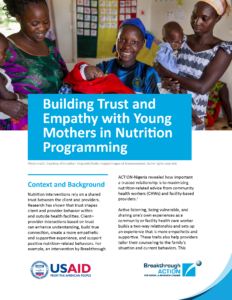Nutrition interventions rely on a shared trust between the client and providers. Research has shown that trust shapes client and provider behavior within and outside health facilities. Client–provider interactions based on trust can enhance understanding, build true connection, create a more empathetic and supportive experience, and support positive nutrition-related behaviors.
Active listening, being vulnerable, and sharing one’s own experiences as a community or facility health care worker builds a two-way relationship and sets up an experience that is more empathetic and supportive. These traits also help providers tailor their counseling to the family’s situation and current behaviors. This approach may be particularly important for young mothers given that many may receive less respect and attention because of providers’ moral judgment of early pregnancy, having much less power than health workers, and having less agency to follow recommendations from community or facility-based health workers.
To further shared learning and highlight the importance of trust, Breakthrough ACTION conducted a literature review to answer the question: How might we build trust and empathy within nutrition programming and with young mothers in particular? The Building Trust and Empathy with Young Mothers in Nutrition Programming brief synthesizes findings and recommendations from a literature review as well as a virtual consultation. The results of the review provide recommendations for ensuring that facilities, communities, and other stakeholders prioritize trust and empathy to positively shape client-provider interactions, improve nutritional outcomes for young mothers and their children, and include them as a component of health systems strengthening.
LEARN MORE
MORE INFORMATION


